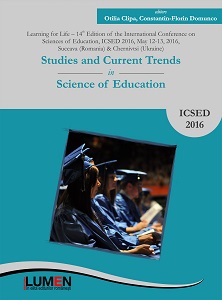Flipped Classroom – Modernization Strategy of
Teaching-Learning Process in Higher Education
Flipped Classroom – Modernization Strategy of
Teaching-Learning Process in Higher Education
Author(s): Mihai Stanciu
Subject(s): Social Sciences
Published by: Editura Lumen, Asociatia Lumen
Keywords: Flipped classroom; higher education experiences regarding the reversed classroom; Flipped Learning and TIC
Summary/Abstract: Reformation of higher education system has also a significant psychopedagogical component, neglected, unfortunately, in Romania. Focusing the didactic approach on student’s needs and interests may represent a way of modernization in the teaching-learning process. International experience highlights the concept of reversed classroom (classe inversée / flipped classroom) as a modernization strategy of teaching-learning process in higher education.Having in view these aspects, the goal of our paper is to make a bibliographic synthesis, presenting some concrete experiences in the development of the didactic approach from universities and, based on this, we have made some suggestions for Romanian higher education.The first experiments dealing with these problems were made by Eric Mazur, professor of Physics at Harvard, starting with 1990’s. As opposed to traditional teaching of academic lectures, in a flipped classroom model the students will watch on line, at home, video lectures with new topics, will carry out research using materials prepared and posted on-line by the teacher (we are not talking here about distance learning). Class activities, carried out in seminar rooms and laboratories, will focus on practical applications, on the effort of solving (in group or individually) of some practical problems.The role played by the teacher changes: he prepares video lessons, organizes favourable situations for an efficient learning, he guides the students’skill development in writing and presenting projects, individually or in group.The implementation process of this teaching-learning strategy pressuposes the existence of an adequate technological support, which means the modernization of the academic environment in accordance with actual trends. At the same time, the teaching staff should be trained continuously and individually to navigate computer technologies involved in the successful implementation of the flipped model.
Book: Studies and Current Trends in Science of Education - ICSED 2016
- Page Range: 291-300
- Page Count: 10
- Publication Year: 2016
- Language: Romanian
- Content File-PDF

